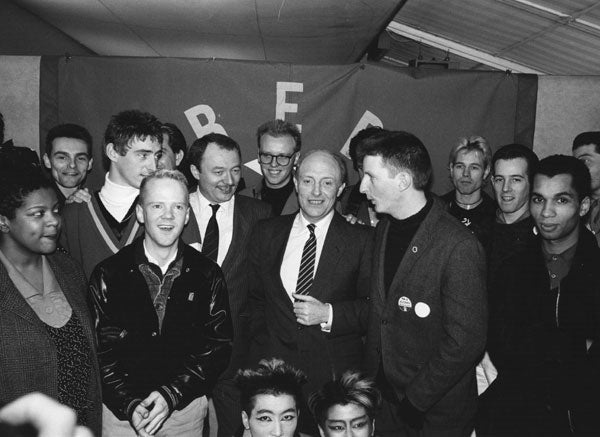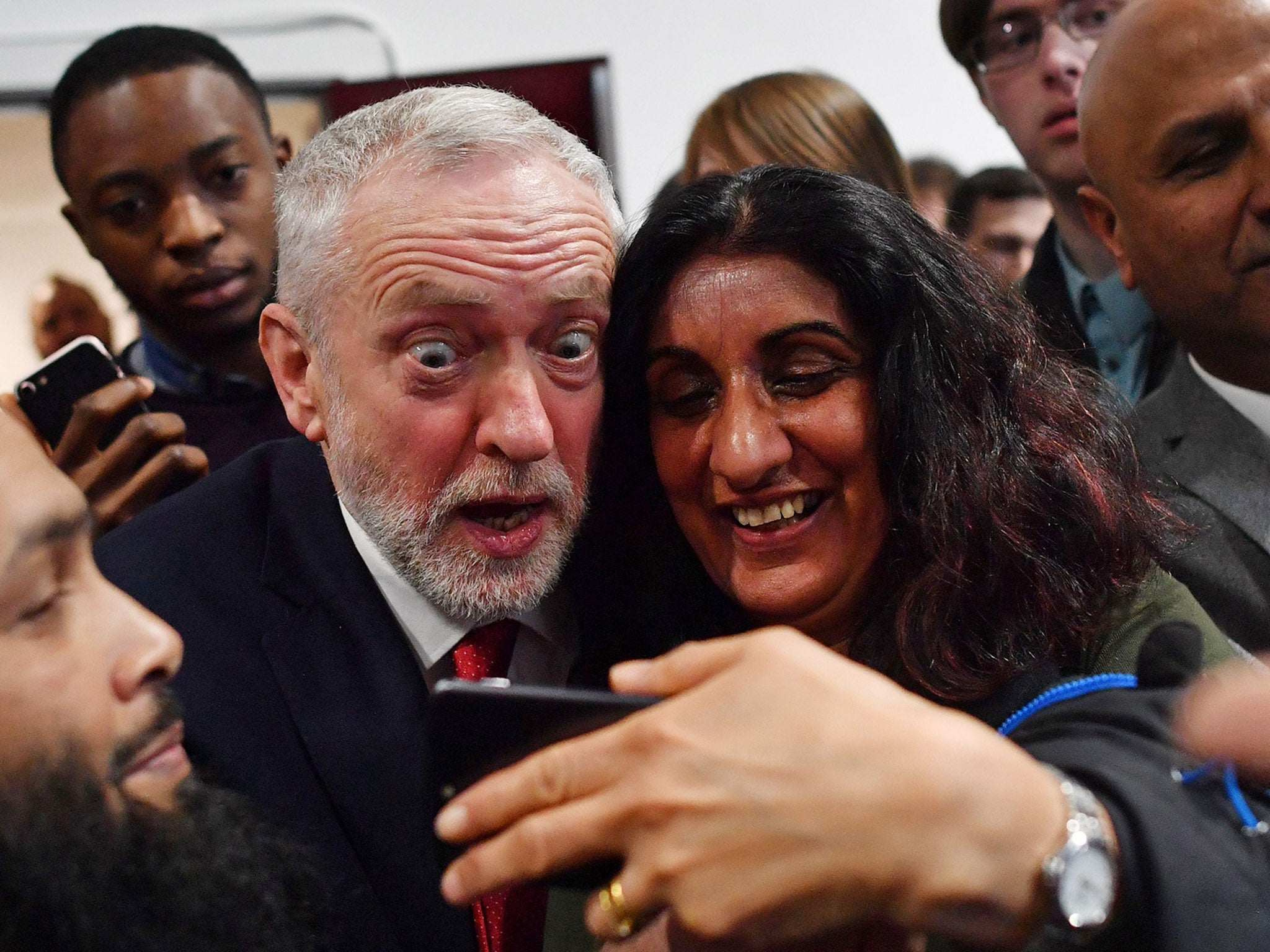For the sake of democracy, it’s time for politicians to get tough on tech
Scandals and years of spin, allied to the rise of social media and shifting public attitudes, have changed the political landscape. Andrew Grice asks whether the dominance of big tech is now imperilling our democratic system and considers what can be done about it


When Theresa May called a surprise election last year Labour rushed out a manifesto which proved remarkably popular. There was, however, a hole at its heart. Plans to renationalise the rail, water and parts of the energy industry had a backward-looking feel, and Labour had nothing to say about the new oligopolies such as Facebook, Google, Amazon and Netflix.
That is one reason why Jeremy Corbyn was keen to take on the digital giants in his speech to the Edinburgh Television Festival in August, proposing that the BBC receive a “digital licence fee” funded by a tax on tech companies or internet service providers. The Labour leader, who said his party faces “greater hostility from the mainstream media than we’ve probably ever had before”, inevitably faced media criticism for some of his ideas – not least in respect of a proposed expansion of “public service journalism”, funded by tech firms, which sceptics doubted would be free from political interference.
But Corbyn’s proposals on the tech multinationals were well timed and reflect a changing public and political mood. In July, Facebook was fined the maximum £500,000 by the UK Information Commissioner after its data was harvested by Cambridge Analytica. Meanwhile, Vote Leave was fined £61,000 and referred to the police after the Electoral Commission ruled that it exceeded its £7m spending limit by channelling £675,000 through pro-Brexit youth group BeLeave. It must be added that it denies the claim.
In the same month, the cross-party Digital, Culture, Media and Sport Select Committee produced a devastating critique of the new media landscape. Damian Collins, its Tory chair, warned that democracy itself is at risk. The committee proposed that social media sites be held responsible for interference in elections by malicious actors and recommended a “clear legal liability” for tech companies which failed to act against harmful and illegal content.
* * *
For the past 36 years, I’ve had a ringside seat at the often bruising battles between politicians and the media; the last 20 of them while working for The Independent. When I became a Westminster-based journalist in 1982, the remnants of a much more deferential age were still evident. The questions we asked were a little more probing than the “is there anything you’d like to say today, prime minister?” style of interrogation that was evident in the 1950s, when television news was launched. But the male-dominated club of parliamentary lobby journalists I joined was unnecessarily secretive. “Maintain the mystique,” one veteran political editor told me.
It was an open secret that the Downing Street press secretary – then Bernard Ingham for Margaret Thatcher – briefed the lobby daily. But we were not allowed to quote Number 10; such briefings had to be attributed to “Whitehall sources”. The archaic system would eventually change, with The Independent among those championing reform after its launch in 1986.
The pro-Conservative majority among the newspapers was always there
The lobby has many critics. Yet if it was scrapped today, it would re-emerge in a different guise tomorrow; politicians and the media need each other, and they need to talk, however strained the relationship. The lobby is not perfect, and still too dominated by men. But some criticism is overdone. Conspiracy theorists on the left recently claimed the existence of a Press Gallery WhatsApp group showed how the lobby pack agrees the line to take on stories. At the time, the group was discussing smelly towels left in the showers and the price of crisps in our canteen.
Much is also made of anonymous briefings by politicians and their advisers. But if these were abolished and all statements were on the record, many would be so bland as to be worthless. It is the journalist’s job to find out what’s going on; people are more willing to talk without having their names attached to a quote: such discussions will always take place. Jeremy Corbyn’s team often relies on such briefings. Do spin doctors abuse this system and lie? Occasionally, but less than you might think; journalists have long memories and won’t believe them next time if they get caught.
The inevitable “poacher versus gamekeeper” relationship between media and politicians has changed markedly during my time at Westminster – and it’s changed for the worse, with both sides being to blame. The pro-Conservative majority among the newspapers was always there. When I joined the lobby, old hands told me: “Right-wing journalists bend over backwards to be fair to the Conservative Party. And left-wing journalists bend over backwards to be fair to… the Conservative Party as well!”

What’s shifted is that some national newspapers have crossed a line, becoming players on the political stage rather than impartial analysts. The dividing line between news and comment has become blurred, and in some cases invisible. It was as if the papers, hit by declining circulations – which fell from a combined 14.8 million in 1983 to 5.9 million last year – decided to shout louder to grab people’s attention. The launch from 1989 of the 24-hour television news channels – first Sky, then a BBC offering – meant the papers were no longer first with the news, and sometimes became more focused on infotainment than information.
The growing influence of TV and the decline of newspapers was made clear when the UK belatedly held its first televised election debates between party leaders at the 2010 general election. The debates dominated press coverage; as soon as one debate ended, the papers previewed the next. Nevertheless, the political spin doctors continue to fret 24/7 about what the papers say, because they often still set the broadcasters’ agenda.
Some elements of the press, particularly on the right, have given news an opinionated twist, and has become less reliable as a result. There’s no doubt that hostile, often inaccurate, coverage of the European Union – and underreporting about the benefits of membership – played a critical role in the decision to hold the 2016 referendum; and in the result.
By then (if not before), some papers had crossed a line between healthy scepticism about politics and its practitioners to unhealthy cynicism. In 2009, The Daily Telegraph was absolutely right to expose abuses of the MPs’ expenses system but there has been a feeding frenzy ever since: a misleading presumption that MPs are in it for themselves. In my view, this has gone too far, fuelling in turn public cynicism and a lack of trust in politicians – though it’s also true to say they contributed to this by trying to spin their way out of troubles they had made themselves.

At the 1992 election, Neil Kinnock, a modernising Labour leader, faced a barrage of highly personal abuse and criticism in the Tory tabloids. The Sun’s front page on polling day declared that if Kinnock won, “will the last person to leave Britain please turn out the lights?” The Sun claimed to have “won it” when the Conservatives were re-elected but the truth was that Rupert Murdoch liked to back the winner (and be seen to have done so) to maximise his influence.
Scarred by Kinnock’s treatment, Tony Blair made a sea change when he became Labour leader two years later. He told me: “I’m not going to let them do to me what they did to Neil. Never again.” In Blair’s view, that meant supping with the devil. He flew halfway round the world to address a conference held by Murdoch in Australia. Blair once said: “It is better to ride the back of a tiger than let it rip your throat out.”
The cosying up was accompanied by a much more aggressive response to negative media reports about Labour – there would be a “rapid rebuttal” or even “pre-buttal” when the party got wind of a potentially damaging story. New Labour spin doctors put pressure on journalists, with threats such as “you’ll never get another interview or exclusive if you write this”; they complained behind reporters’ backs to their editor, occasionally even demanding their removal. They doled out exclusive stories to favoured journalists or papers, though there was nothing new in that.
Blair’s “hug them close” strategy worked, at least in opposition. The Sun, the country’s biggest selling paper, came out for Labour at the 1997 election (which it was bound to win in any event). In government though, New Labour became too eager to please its media enemies-turned-friends. Lance Price, who was deputy to Alastair Campbell, Blair’s communications director, said “no major decision could be taken by the government without first assessing the reaction of three people”: Gordon Brown, the chancellor; John Prescott, the deputy prime minister; and Murdoch.

Spin had its limitations of course. Headline-grabbing works in opposition, when the media is your main weapon; but in power, New Labour discovered that headlines were no substitute for policy or action. Spin would also, in the end, contribute to Blair’s demise; and help to tarnish his legacy. In 2003, he discovered that you cannot spin the case for war, when it is based on non-existent weapons of mass destruction in Iraq.
As papers like The Sun tired of Blair and reverted to type, he launched an attack on the “feral beasts” of the media in one of his last speeches as prime minister. I sat in the front row, appalled that he bizarrely singled out The Independent for criticism when his real target was the Daily Mail; he was still too frightened of its power to say so.
David Cameron copied the New Labour playbook when he began modernising the Conservatives on becoming their leader in 2005. Mirroring Blair’s trip to Australia, Cameron flew to the Google Zeitgeist conference in San Francisco in 2007, symbolically paying homage to the new power in the media world. Cameron, who called Blair “the master”, faithfully adopted his top-down, centralised approach to media management, and imported it into government in 2010. The cosy relationship between leading figures in the government and media was highlighted again during the Leveson inquiry after the phone-hacking scandal.
Politics is certainly more polarised that I have ever known...
When Theresa May succeeded Cameron after his ill-fated EU referendum in 2016 she set out to do everything differently. That included moving away from a rigid day-to-day “grid” of centrally controlled initiatives designed to allow the government to set the agenda. May tried to curb headline-grabbing stunts, and focus on fewer, bigger statements. It was an honest attempt to combat spin, but didn’t work in a digital age when the battle between government and media (and between parties, and even between factions within parties) had become ever faster and more frenetic. However, it is doubtful whether any administration could dictate the agenda while Brexit eclipses everything.
May’s disastrous snap election last year would prove a watershed for the press. Right-wing papers reprised their 1992 treatment of Kinnock to target Corbyn, but this time – refreshingly – it didn’t work. In the age of the insurgent, already exploited by Trump and the Brexiteers, social media helped Corbyn bypass the mainstream media (the hated “MSM” in Corbynland). Friends sharing pro-Labour stories on Facebook and other social platforms proved a powerful weapon. Labour’s machine outgunned the Tories, diluting the impact of the right-leaning press.

However, it remains to be seen whether the old media has really been replaced by new media which, despite the early optimism about “digital democracy” during Barack Obama’s presidential campaigns, seems actually to undermine rather than enhance democracy. In those days of hope, I didn’t imagine Trump tweeting from the White House at 5am about the “fake news media” and journalists who are “the enemy of the people”.
Politics is certainly more polarised that I have ever known – no coincidence when filter bubbles create echo chambers that reinforce our own views. The abuse hurled around on Twitter, between fellow party members as well as opponents, is nasty, often misogynistic and sometimes racist. It scars our politics.
* * *
At the 2017 election, parties spent more than 40 per cent of their advertising budgets online. During the EU referendum, Vote Leave devoted 98 per cent of its ad spend to digital, much on highly targeted “dark” ads which no one but the recipients could see. It ran a last-minute blitz claiming falsely: “Turkey (population 76 million) is joining the EU. Our schools and hospitals already can’t cope!”
The social media ads used by Donald Trump and the Leave campaign are the most lethal political weapons ever invented
The tech giants have been slow to put their house in order, and politicians slow to force them. While claiming to be platforms rather than publishers, they have often paid little tax in countries where they made vast profits. They have demolished the economic model of newspapers by gobbling up much of their advertising revenue. Some 300 local papers have closed in the UK in the past 10 years, undermining democracy at local leve
Politicians want to sound modern and offer a vision of the future. But Tom Baldwin, a former political journalist who was Ed Miliband’s communications director, believes they do not understand the new technology and are afraid to regulate the new giants roaming the media landscape. In a revealing and thoughtful new book covering politics on both sides of the Atlantic, Ctrl Alt Delete, published by Hurst, Baldwin argues that the new information age “has unpicked truth and hollowed out space for a virulent new strain of populism to spread like a contagion across all forms of media”. He says: “The social media ads that were used by Donald Trump and the Leave campaign are the most lethal political weapons ever invented.”
What, then, needs to be done? The government plans to require an imprint showing the identity of those running digital ads, and a new offence of intimidating parliamentary candidates and party campaigners. But it will need to go much further to ensure a system of electoral law brought in for an analogue era is fit for a fast-evolving digital age.
Regulators such as the Electoral Commission and Information Commissioner need more powers, resources and tougher penalties. They could be funded by a levy on the tech giants. There should be a statutory code of practice covering the use of personal data by political campaigns. All political ads should be published in some sort of central register so that everyone can see them. In election periods, ads should be limited to registered campaigns, following evidence of Russian interference in the last US presidential election and the Brexit referendum.
There is rising political support for a ban on online political ads, to bring the internet into line with broadcast media. It extends from Baldwin on the left to William Hague, the former Tory leader, on the right. This would help to stop those with the deepest pockets enjoying an unfair advantage, but would not prevent videos being shared.
For a government consumed by Brexit, such reforms might not look like a priority. But with growing evidence that our democracy is under threat, the task is urgent.
Join our commenting forum
Join thought-provoking conversations, follow other Independent readers and see their replies
Comments
Bookmark popover
Removed from bookmarks